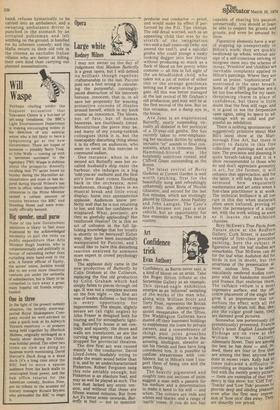Opera
Large white
Rodney Milnes _
I may not swear on the day of judgement that Madam Butterfly is a great opera, but I will defend its brilliant though repellent craftsmanship to the last. Puccini puts not a foot wrong in calculating the purposeful, cunninglypaced destruction of his innocent heroine, innocent, that is, in all save her propensity for weaving protective cocoons of illusion around herself, which in my book counts as innocence. The blows, not of fate, but of human baseness, are faultlessly timed. Meretricious the piece may be, and many of my young-turkish colleagues think it is, but the inescapably disturbing thing about it is its effect on audiences, who seem to revel in this exercise in communal sadism.
One instance:, when in the second act Butterfly sees her socalled husband's ship enter the harbour, she indulges in a big 'told-you-so' outburst and the first act's love duet comes flooding back in the orchestra; most audiences, though there is no musical break and little voca,1 display, burst into spontaneous applause. Audiences know perfectly well that he is not returning to her, and that her confidence is misplaced. What, precisely, are they so gleefully applauding? Her reinforced illusion? Or is this an act of collusion in the full liplicking knowledge that her loyalty is shortly to be betrayed? Either way, they have been successfully manipulated by Puccini, and I would like to have this disturbing reaction analysed by someone more expert in crowd psychology than me.
The applause duly came in the new production of Butterfly by Colin Graham at the Coliseum, replacing the fine old production by Colin Graham which had simply fallen to pieces through old age. It was not a complete success on the first night — the first act was of leaden dullness — but there is every opportunity for improvement. The simple, slightly severe set (all right angles) by John Fraser is designed both for touring and for atmospheric lighting. Butterfly's house is set centrally and squarely, the doors and walls are translucent, as are the curving wing pieces that can be dropped for provincial theatres.
The dire first act was caused mainly by the conductor, David Lloyd-Jones, laudably trying to make the music sound better than it is, and by an undercharacterised Pinkerton. Robert Ferguson sang this role amiably enough, but Pinkerton is an absolute heel, and may as well be played as such. The love duet lacked any erotic ten
sion, and without that these are fifteen wasted minutes. But from Act 2's letter scene onwards, Butterfly is fool — not to mention producer and conductor — proof,
and would make its effect if per formed by the P.G. Tips chimps.
The odd detail worried, such as an appealing child that was by no stretch of the imagination two-and-a-half-years-old (why not amend the text?), and a suicidal geisha who could plunge a nasty looking dagger into her throat without producing so much as a fleck of blood on her pretty white costume — all this in full sight of the un-blindfolded child, who takes not a jot of notice of either this or the strange gentleman belting out F sharps at the garden gate. All this was better managed at the last revival of Mr Graham's old production, and may well be at the first revival of the new. But on this occasion, not a damp eye in , the house.
Ava June is an experienced Butterfly, neatly suspending vir tually all disbelief in her portrayal of a 15-year-old geisha. She has recently taken to over-emphasising her excellent diction by adding intrusive "er" sounds to final con sonants, which is tiresome. Derek Hammond-Stroud was the helplessly solicitous consul, and Clifford Grant outstanding as the Bonze.
The latest revival of Boris Godunov at Covent Garden is well worth catching, first for the beautifully sung and refreshingly unhammily acted Boris of Nicolai Ghiaurov, and second for the last five minutes, which are rivetingly played by Ghiaurov, Anne Pashley and John Lanigan. The Czar's death became not just a star vehicle, but an opportunity for fine ensemble acting. The rest is routine.


































 Previous page
Previous page